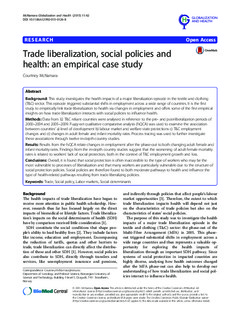| dc.contributor.author | McNamara, Courtney L. | |
| dc.date.accessioned | 2015-11-17T11:57:16Z | |
| dc.date.accessioned | 2015-11-18T11:48:23Z | |
| dc.date.available | 2015-11-17T11:57:16Z | |
| dc.date.available | 2015-11-18T11:48:23Z | |
| dc.date.issued | 2015 | |
| dc.identifier.citation | Globalization and Health 2015, 11(42) | nb_NO |
| dc.identifier.issn | 1744-8603 | |
| dc.identifier.uri | http://hdl.handle.net/11250/2364474 | |
| dc.description.abstract | Background:
This study investigates the health impacts of a major liberalization episode in the textile and clothing (T&C) sector. This episode triggered substantial shifts in employment across a wide range of countries. It is the first study to empirically link trade liberalization to health via changes in employment and offers some of the first empirical insights on how trade liberalization interacts with social policies to influence health.
Methods:
Data from 32 T&C reliant countries were analysed in reference to the pre- and post-liberalization periods of 2000–2004 and 2005–2009. Fuzzy-set qualitative comparative analysis (fsQCA) was used to examine the association between countries’ a) level of development b) labour market and welfare state protections c) T&C employment changes and d) changes in adult female and infant mortality rates. Process tracing was used to further investigate these associations through twelve in-depth country studies.
Results:
Results from the fsQCA relate changes in employment after the phase-out to both changing adult female and infant mortality rates. Findings from the in-depth country studies suggest that the worsening of adult female mortality rates is related to workers’ lack of social protection, both in the context of T&C employment growth and loss.
Conclusions:
Overall, it is found that social protection is often inaccessible to the type of workers who may be the most vulnerable to processes of liberalization and that many workers are particularly vulnerable due to the structure of social protection policies. Social policies are therefore found to both moderate pathways to health and influence the type of health-related pathways resulting from trade liberalizing policies. | nb_NO |
| dc.language.iso | eng | nb_NO |
| dc.publisher | BioMed Central | nb_NO |
| dc.title | Trade liberalization, social policies and health: an empirical case study | nb_NO |
| dc.type | Journal article | nb_NO |
| dc.type | Peer reviewed | en_GB |
| dc.date.updated | 2015-11-17T11:57:16Z | |
| dc.source.volume | 11 | nb_NO |
| dc.source.journal | Globalization and Health | nb_NO |
| dc.source.issue | 1 | nb_NO |
| dc.identifier.doi | 10.1186/s12992-015-0126-8 | |
| dc.identifier.cristin | 1264824 | |
| dc.description.localcode | © 2015 McNamara. Open AccessThis article is distributed under the terms of the Creative Commons Attribution 4.0 International License (http://creativecommons.org/licenses/by/4.0/), which permits unrestricted use, distribution, and reproduction in any medium, provided you give appropriate credit to the original author(s) and the source, provide a link to the Creative Commons license, and indicate if changes were made. The Creative Commons Public Domain Dedication waiver (http://creativecommons.org/publicdomain/zero/1.0/) applies to the data made available in this article, unless otherwise stated. | nb_NO |
